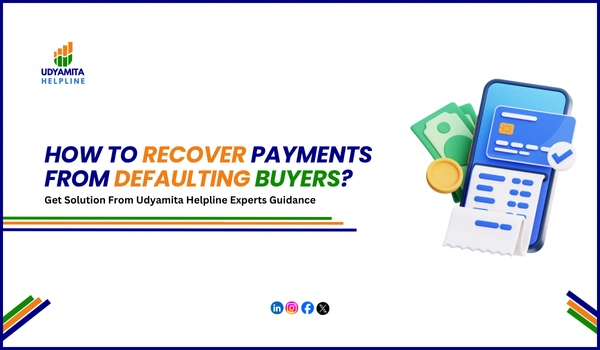Making payments late or not at all can create significant financial problems for Micro, Small, and Medium Enterprises (MSMEs) in India. Business owners often have no course of action after they have provided a product/service to solicit payment. There are also implications of slow pay that will affect cash flow, scaling the business, or systems.
In this article, we detail how to recover Payments from defaulting buyers, the recourse available for MSMEs under the MSMEs Act, and show how to use a platform such as Udyamita Helpline to guarantee timely payment.
Who Are Defaulting Buyers?
A defaulting buyer refers to an individual or organization that fails to fulfill payment obligations within the specified time limit. Although the buyer has received products or services, he or she defers payment or refuses to pay, which places a financial burden on the supplier or service provider.
Steps To Recover Payments From Defaulting Buyers
Recovering overdue payments without going to court from a buyer who has not made a payment can be a challenge. Here’s a simple step-by-step process to follow.
1. Send a Friendly Payment Reminder
This could be as simple as a reminder in an email or a message – most buyers are not purposely avoiding payment, they may simply have forgotten, or don’t want to admit that they forgot to pay! A friendly nudge pointing out the amount due and when it is due, and most of the time, it will get it done.
2. Send Written Notice
If the buyer completely ignores the friendly reminder you sent, send a notice in writing (you may also want to send it certified mail) stating the amount owed, the due date, and any penalties, if applicable. Make sure you keep copies of whatever communication you sent and whatever they communicated to you, as it will become important later in the process.
3. Negotiate Payment Terms
If the buyer isn’t ignoring payment, but is just having actual financial problems that they actually open with you and propose that they just can’t pay the full amount at one time, it would be reasonable to negotiate a payment term. You can put the buyer into two or three installments, depending on how long they have had to respond.
4. Send a Legal Demand Notice
If informal communication fails to resolve the issue, a legal demand notice can be sent ultimately through a lawyer. This notice should indicate the amount owed and provide a final date to pay, usually no more than 15-30 days.
5. Raise a Complaint with MSME Samadhaan Portal
If your business has an MSME registration, you can raise with the MSME Samadhaan Portal. The Facilitation Council will direct the buyer to pay the amount owed, along with interest on the amount owed.
6. Go to the Debt Recovery Tribunal or Civil Court
If it is a higher value claim, or there are more complex circumstances, you may wish to raise it with or file a case with a Debt Recovery Tribunal (DRT), or the civil court. This is probably a better option for a higher value claim, or if the buyer has defaulted previously.
7. Use a Professional Recovery Service
If the legal option is too complicated, there are professional or expert platforms to use, such as Udyamita Helpline. This provides support to the MSME in writing the letters, raising the complaint, and even following up with the defaulting buyer.
8. Keep Appropriate Records
In all circumstances, ensure that records of all invoices, contracts, proof of delivery, and records of communications about the payment due are kept.
9. Preventing Future Defaults
To minimize the chance of getting into similar situations going forward, you should perform due diligence on your buyer, take part or full upfront deposits, and implement a penalty clause. You should monitor all unpaid invoices and reach out to the buyer when payments are late.
How Udyamita Helpline Helps In Recovering Payments?
The Udyamita Helpline helps MSMEs recover payments from defaulting buyers and officials who refuse to pay. Udyamita Helpline can assist MSMEs with:
- – Legal Advice: A lawyer can advise on the best way to go about recovering.
- – Drafting Demand Notices: A lawyer can assist with drafting and sending demand notices to a buyer.
- MSME Samadhaan Support: The Helpline provides support in complaining the official MSME Samadhaan Portal.
- Following up on Cases: Checking in on cases of recovery regularly.
- Negotiation Support: The Helpline mediates between parties to settle.
- Preventive Legal Advice: Advice on payment terms and conditions, and drafting contracts to prevent defaults in the future.
For detailed information you can simply connect to Udyamita Helpline Experts in India via mail advisor@udyamitahelpline.com
Conclusion
Defaulted payment continues to be one of the major challenges faced by MSMEs. If an MSME continues to experience these issues, the MSME Act of 2006 comes with its recommendations for significant legal protection to support recovering dues. Once a delay has been established, the tools available, such as the MSME Samadhaan Portal to seek professional expertise from the Udyamita Helpline, will make that process positive for all parties in recovering payment promptly, with your financial health at the forefront. Should you be an MSME facing payment delays, follow a proactive course of action today and access the professional expertise available to you from Udyamita Helpline to reclaim what is rightfully yours, your income.
FAQs
How Can MSMEs Recover Payments From Defaulting Buyers?
They can send reminders, issue legal notices, and file complaints on the MSME Samadhaan Portal for resolution.
Can I Take Legal Action Against A Buyer Who Refuses To Pay?
Yes, MSMEs can send a legal demand notice or approach the MSE Facilitation Council or Debt Recovery Tribunal.
How Does Udyamita Helpline Help In Payment Recovery?
It provides legal guidance, drafts notices, assists in filing complaints, and follows up with defaulters.
How Can MSMEs Avoid Defaulting On Buyers In The Future?
By checking buyer credibility, taking part payments in advance, and setting clear payment terms.


